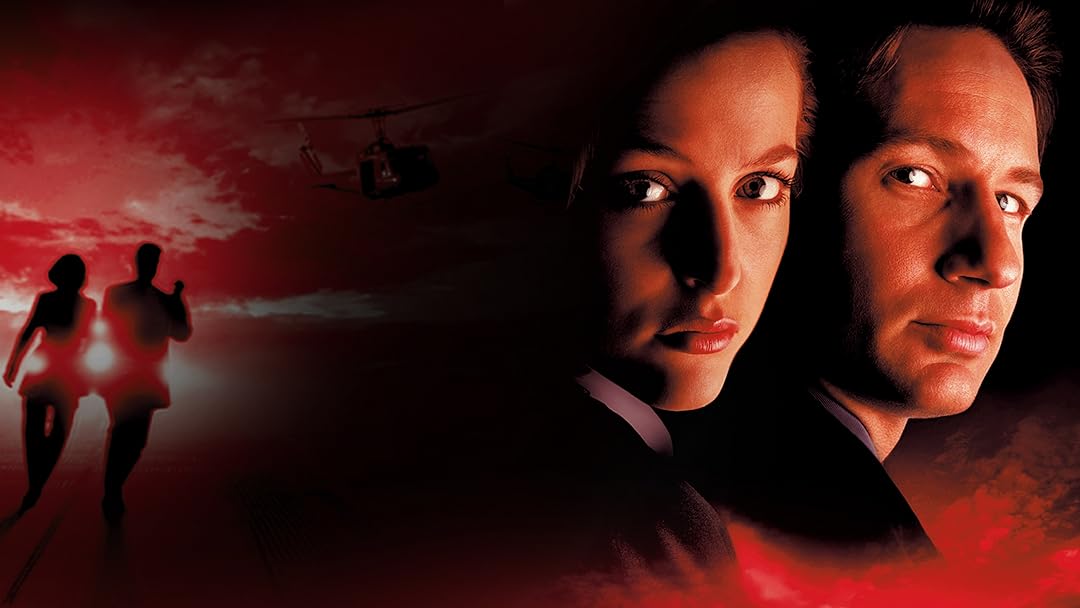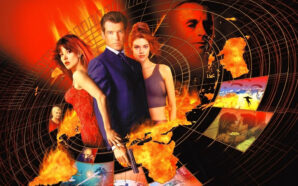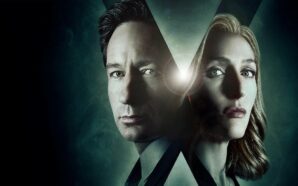Early on in The X-Files movie, Mulder is seen urinating on an Independence Day poster. It’s Chris Carter delivering a little meta jab at the blockbuster, a film he hated, despite there being parallels between the two in their respective third acts. In Independence Day, the heroes infiltrate the alien mothership and upload a computer virus, while in The X-Files Mulder sneaks aboard a huge UFO to inject an antidote to a biological virus. But beyond this similarity, they are two drastically different types of alien invasion movie. The X-Files doesn’t really feel like a science fiction film for most of its runtime, nor does it aim to be an action movie. The film’s biggest success is perhaps its biggest problem too: it feels like the show.
1998’s The X-Files, also known as Fight the Future, is the big screen continuation of the show’s then five seasons of mythology storytelling. The budget is bigger, the music more bombastic, and there’s a new aspect ratio to show off the cinematography. Mulder can also say ‘shit’ now. But it soon becomes apparent the only real changes from giving The X-Files the movie treatment are surface level. The film just feels like a regular two-part episode of the show. In that regard it feels very much like what Star Trek: Insurrection is to Star Trek: The Next Generation. The budget might be bigger but that’s not very apparent in the film’s scale. The show already looks fantastic and feels big, so the movie isn’t the step up that it perhaps needs be.
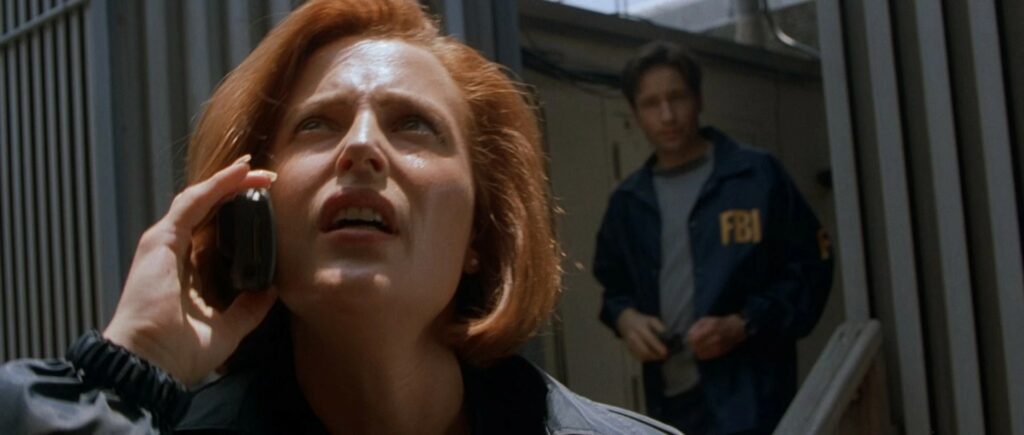
“Mulder, it’s me.” With that familiar introductory line for Scully, it’s immediately apparent that the move to cinema hasn’t changed the voice of the characters. In the plus side of the film feeling like the show, Mulder and Scully are consistent in both writing and performance. The pair are introduced debating hard evidence and being open to the unexpected. It’s true to the characters but the case they’re on isn’t what I want to see. We catch up to them dealing with a terrorist threat, searching a government building for a bomb. For a film dealing exclusively with the government conspiracy side of the show, I wish there was more of a James Bond style opening. The film could open with the end of their last case, a narratively unconnected sequence to introduce the characters that would allow a big screen version of one of their supernatural cases.
But before long Mulder is drawn into an all too familiar conspiracy after being approached by a new informant, played by Martin Landau. Using such a known actor gives the character some weight but really he’s just a cardboard cut-out. Chris Carter clearly only has one way to start mythology stories and by now it’s incredibly tired. We’ve seen so many informants across the show and Landau’s isn’t sufficiently unique. They try to play him off as a conspiracy kook, manipulating Mulder to get details for a book he’s writing, which has potential to be an interesting twist. But then that’s dismissed and he’s revealed to not only be speaking the truth but also knew Mulder’s father, like every other informant.
Mulder and Scully feel impotent in the film. They discover very little on their own. There’s little joy in seeing them investigate anything. Instead they get told everything by other characters and then the film cuts to the villains’ perspective to give the audience additional information. Mulder and Scully might be the protagonists but they do very little of consequence. There’s not even a confrontation between the heroes and villains. They are never in the same place; the only Syndicate members Mulder meets are those that help him. Instead, Mulder and Scully seem to spend much of the movie running through corn fields, chased by helicopters, and shouting each other’s names.
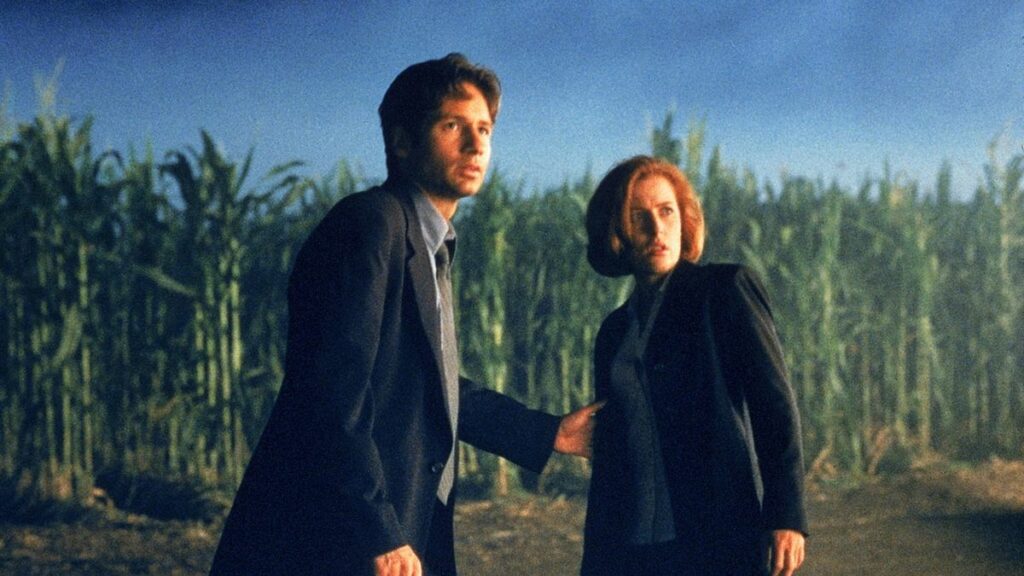
Watching the film at the correct time during a rewatch of the show, I can’t help but feel the fifth season did an injustice to the movie. That season was very candid about the mythology plot, laying out how the aliens plan to colonise Earth and how the Syndicate is aiding them. Therefore, there’s little to actually reveal in the film. There are very few new elements, and the movie feels like less of a culmination or wrap-up and more of a recap instead, drawing all the already revealed aspects together. To be fair, the film does finally give an answer to the bee storyline, it’s just one I find very silly.
But overall nothing changes in the mythology storyline in this film. Everything is the same at the end as it was at the beginning. The film was written to be the first in a series, but instead the storyline was continued as more seasons of the show, and I have no idea how many films Chris Carter wanted because there’s no forward propulsion to this story at all.
The one significant piece of information the movie offers is the exact nature of the black oil the alien colonists are tasking their human allies with spreading. It’s a virus that causes human bodies to become incubators for an alien lifeform, like Alien, or considering it’s a black liquid, more like Prometheus. I like this development. It would eliminate humanity while also repopulating Earth with extraterrestrials, and learning this information creates good drama within the Syndicate, with them now realising just what it is they are doing. It does beg the question of what the Syndicate were expecting, though. Did they think they would rule over the enslaved humans with the aliens? The story never details their motivations.
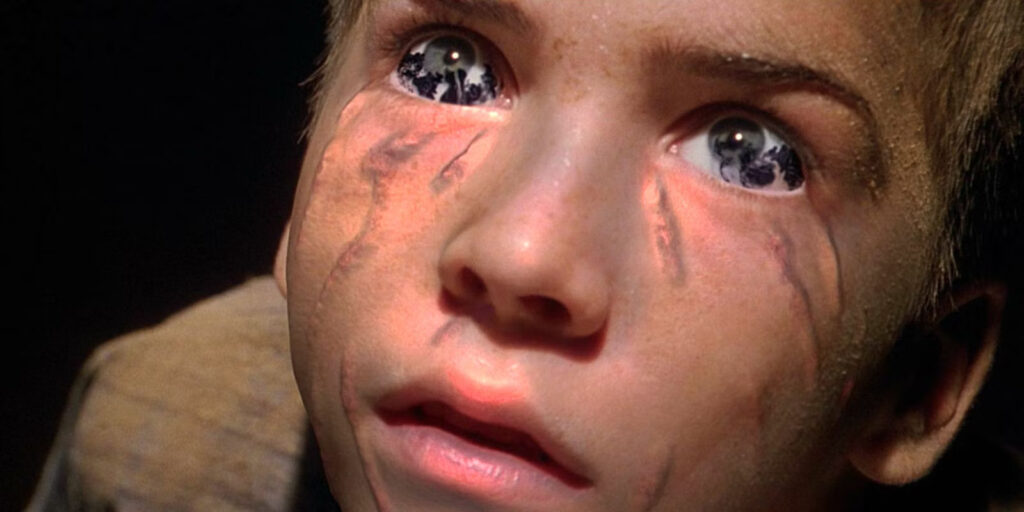
The X-Files is very much Mulder’s movie. We follow him, he’s the impetus for everything, and Scully is relegated to a sidekick who’s along for the ride. Begrudgingly so, too. The film does such a disservice to the character. She doesn’t want to investigate anything, is dragged along by Mulder, acts like a stick-in-the-mud, and then decides she wants to quit the FBI. It’s some drama created purely for the film, and by the end she has a change of heart and decides to continue on with Mulder. In a film that only teases advancement in storylines without following through, Mulder and Scully almost kiss but are interrupted when an alien virus-carrying bee stings Scully. Movie or episode, Scully can never make it through a mythology story without being hospitalised, and she spends much of the film’s second half unconscious. How disappointing.
The film found itself in a very difficult position. It had an almost impossible task: to please both new viewers and hardcore fans. In trying to please everyone, it pleases no one. There is still a lot for new viewers to catch up on while returning fans will find that the story has been streamlined and simplified in ways that aren’t totally satisfying. Mulder drunkenly explains his backstory to a bartender acting as a surrogate for new viewers in a clunky exposition scene, while Scully details her past to make a point to Mulder. Going from television to film, unsure of which medium the story would continue after, is a rare problem to have. I wonder how the upcoming Star Wars film The Mandalorian and Grogu will tackle the transition.
The film was shot between the fourth and fifth seasons of the show but premiered after the fifth had aired. This meant much of the mythology storytelling in season 5 was setup for the film’s story. And yet so many elements from that season are nowhere to be seen. There’s no appearance or mention of Jeffrey Spender or Diana Fowley. No alien rebel faction. No hint of a familial connection between Mulder and the Cigarette-Smoking Man, who appears in the film but does very little, being superseded by several other Syndicate members, including the apparent leader who never reappears. If the franchise did continue as a film series like originally planned, would these elements have been reintroduced in sequels or eliminated from the story completely? Besides Mulder, Scully, and the baddies, the only other returning characters are Skinner and the Lone Gunmen, who have minor roles. Although it’s nice to see Terry O’Quinn cast as yet another character across The X-Files/Millennium universe.
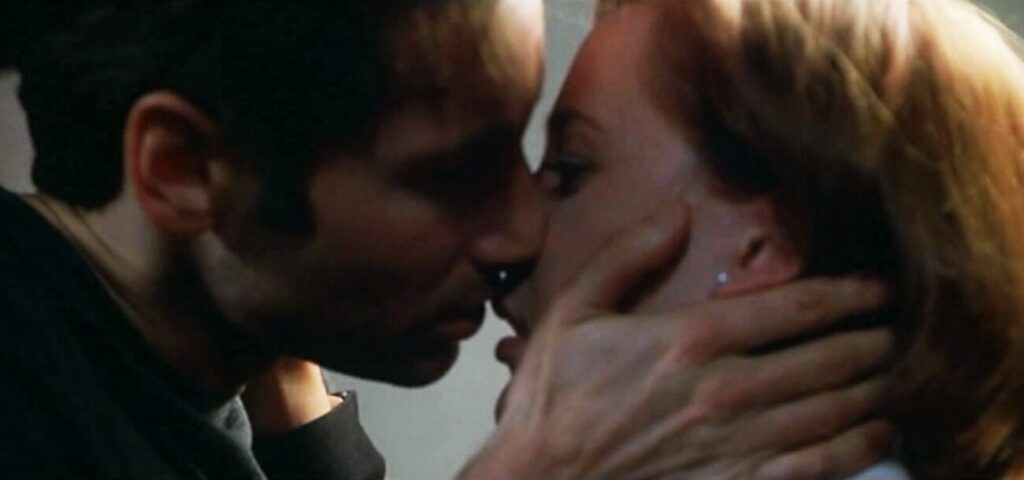
The last half hour gives viewers what they’re looking for. Mulder in a giant UFO, buried under the ice in Antarctica, rescuing Scully, getting chased by aliens, and escaping before it takes off. It’s the one larger scale sequence that feels like a movie, competently handled by director Rob Bowman, who proved to be one of the more cinematic directors of the series. So much so that there are episodes of the show that feel more cinematic than the film.
While it was supposed to springboard Mulder and Scully into further big screen exploits, 1998’s The X-Files instead ends up feeling like a very expensive commercial for the series, soon to begin its sixth season. It’s not the next giant leap for the franchise but instead a small step between seasons, inviting newcomers for more small screen adventures. In ways both good and bad, the film feels like the show, it’s just that it feels like the episodes of the show I don’t care for. It might be an unpopular opinion but I remember much preferring the second movie, The X-Files: I Want to Believe, to this first attempt. But I’ve got four more seasons of the show to get through before I get there.




